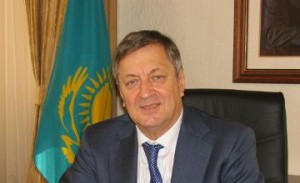Russian and Japanese companies will be involved in plans to construct two nuclear power plants in Kazakhstan, according to Energy Minister Vladimir Shkolnik.
It is planned that Rosatom, a Russian concern, will start construction in Kurchatov, a city in the eastern part of the country that was once a nuclear capital of the Soviet Union, while Toshiba, the Japanese corporation, will receive a patch of land near Lake Balkhash in the Almaty region. None of the construction agreements have been signed yet, but Shkolnik has assured that both projects will meet the highest safety standards.
In September 2014 the draft of a cooperation agreement on the construction of nuclear power plant has been submitted by the Kazakh Ministry of Energy to Rosatom. It is expected to approve the document in 2015. However, according to media reports, both sides still negotiate concerning the type of the reactor, as Astana insists on medium power reactor, which Rosatom does not have. Japanese Toshiba Westinghouse also cannot offer this reactor type, while Kazakhstan cannot afford the 1 GW capacity reactors, because of the lack of infrastructure.
The issue of building a second nuclear power plant is expected to be resolved after 2019, when the creation of a single energy market within the framework of the Eurasian Economic Union will be completed.
“The final decision will depend on how well we manage our energy consumption and cope with economic development tendencies. We can use the possibility of additional electricity export to neighbouring countries after the creation of a single energy market in 2019,” Shkolnik said in the Mazhilis (the lower house) of Parliament on Jan. 26 when presenting the overall policies in the energy field to the deputies.
The approximate cost of the two plants is $8 billion, including design, research and development, fuel and construction work. This ambitious project, however, is only in the development stage.
“The decision concerning the Balkhash area has not been made yet, but even at this stage we consider Toshiba Westinghouse one of the most perspective variants. Kazakhstan is an absolute shareholder and this is a promising project,” Shkolnik said. Several deputies, however, have not reacted positively to the nuclear energy perspectives. Some parliamentarians expressed their disagreement with nuclear plant construction in the country, arguing that this kind of profit isn’t worth turning the land into a radioactive deposit.
Yet Mazhilis (lower house of Parliament) deputy and doctor of technical sciences Viktor Kiyansky noted that nuclear power development is a vital process for Kazakhstan and has to be launched as soon as possible.
“Why can’t we produce a product, an electric energy with a high added value, using nuclear power plants? We have all the necessary equipment for that,” said Kiyansky.
He also added that these plants don’t have to be nuclear, as there is an opportunity to establish a domestic power unit with a thorium reactor. This means that radioactive waste, rather than potentially-dangerous uranium, would be used to bring the plant into action.
In case both projects are realised, Kazakhstan could become the first country to have two fundamentally-different nuclear power stations – one based on Russian expertise and the other on Japanese-American technology. While Rosatom and Toshiba negotiate construction issues, the Kazakh government is looking for future markets. There are plans to use the produced energy for national needs, as well as export it to partners in Afghanistan and Pakistan, among others.


